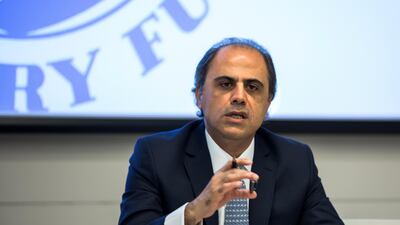The Middle East head of the International Monetary Fund urged Lebanon to get its finances in order, as voters head to the polls on Sunday for the country’s first parliamentary elections in nine years.
Jihad Azour, director of the Middle East and Central Asia Department at the IMF, called on Lebanon to slash its budget deficit, reduce public debt and use $11 billion of international aid secured in Paris last month to invest in growth sectors such as energy and telecoms.
"First and foremost, [a new parliament] must address the macro-fiscal vulnerabilities by reducing the level of deficit in the budget," Mr Azour, who served as Lebanese finance minister from 2005-2008, told The National. "For a country where the level of debt is as high as it is in Lebanon, and in the context of changing market conditions with a potential increase in interest rates and liquidity, it's very important for Lebanon to pursue and accelerate fiscal adjustment."
Lebanon has one of the highest debt-to-GDP ratios in the world – which could could balloon to 180 per cent by 2023 from a current 150 per cent if the government does not implement reforms to narrow its fiscal deficit, the Washington-based lender warned in February. Public debt stands at above $81bn and the government has financed its deficit through the issuance of treasury bills and Eurobonds. Its banking system has in the past also provided a buffer against external shocks like the 2008 global credit crisis by maintaining high interest rates on deposits that helped attract as much as $1.5bn a month in the wake of the crisis.
________________
Read more:
IMF expects GCC economic growth to pick up
Lebanon's donor conference is a 'Band-Aid' to the debt-laden country's financial woes
IMF says global growth to slow in medium term as it warns of trade war harm
________________
The first priority of the post-elections cabinet “has to be to stimulate growth”, said Nassib Ghobril, chief economist at Byblos Bank, the third-largest Lebanese lender by assets.
The reverberations of an ongoing seven-year war in neighbouring Syria has negatively impacted Lebanon's economy, stifling trade and deterring investors. The influx of more than a million refugees is piling pressure on an already stretched public purse. Internal political bickering also left the country without a president for 29 months until October 2016.
Economic growth is expected to remain constrained this year, accelerating to 1.5 per cent from 1.2 per cent in 2017, and markedly lower than the 8 per cent recorded in 2010 before the war in Syria, according to the fund’s latest Regional Economic Outlook, published last week.
In March Lebanon’s cabinet agreed a 2018 budget, which projects a fiscal deficit $145m lower than in 2017. Against this backdrop of security, political and economic crises, the country has not held parliamentary elections since 2009.
Mr Azour urged the incoming lawmakers to use the package of financial aid approved by the international community at the CEDRE conference last month to shore up Lebanon’s key growth sectors, including energy, telecoms and technology.
The $11bn package – described by an analyst as a “Band-Aid” for Lebanon’s problems – is intended to help finance the first five-year period of the Capital Investment Programme spanning 2018 to 2022.
“This new opportunity provided by the international support has to be invested smartly to restructure and reform certain key sectors,” Mr Azour said. The most important is energy. Lebanon must reduce deficit levels in energy companies and improve quality of services, he said.
In addition, the new parliament must be cognisant of the economic impact of conflict in Syria on Lebanon.
“Decision makers need to ensure their policies are helping the economy grow faster, that their reform agenda will not create additional deficit, and that they will create more stability by having the right macroeconomic management,” Mr Azour said.
However, Mr Ghobril said while the IMF’s “first impulse is to advocate tax increases and the lifting of subsidies in any country” to reduce fiscal deficit, this is the “wrong recipe” for the country.
Tax and fee increases the Lebanese parliament endorsed last October have "asphyxiated the economy in the first quarter of this year, and increased operating costs on the private sector,” he said.
“Tax evasion in Lebanon is widespread, so the government’s priority to increase revenues is to fight tax evasion and improve fee collection, instead of imposing new taxes or raising existing ones,” Mr Ghobril said.

